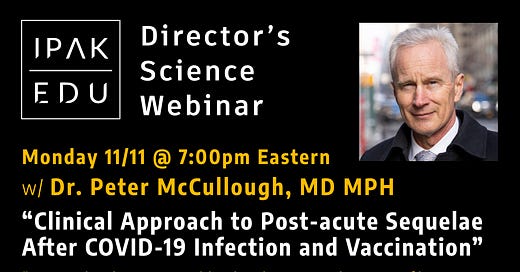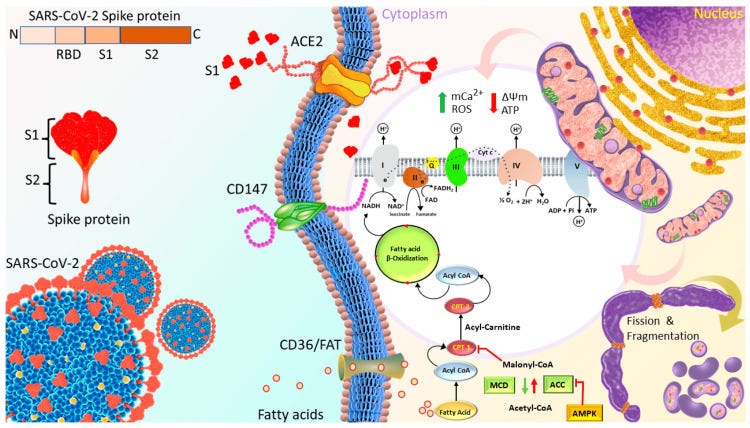IPAK-EDU Director’s Science Webinar
Monday 11/11 @ 7:00pm Eastern
with/ Dr. Peter McCullough, MD MPH
“Base Spike Detoxification for Post-Acute Sequelae After SARS-CoV-2 Infection and COVID-19 Vaccination”
“Retained Spike protein in blood and tissues is the cause of long-COVID and vaccine injury syndromes. This lecture will position Spike protein as a treatment target through the process of aided catabolism with proteolytic enzymes and anti-inflammatory natural products.”
-
Join us as we welcome back Dr. McCullough to the webinar.
Dr. McCullough will present on the findings of a recent paper published in Cureus:
https://pubmed.ncbi.nlm.nih.gov/38024037/
Abstract
The spike protein of SARS-CoV-2 has been found to exhibit pathogenic characteristics and be a possible cause of post-acute sequelae after SARS-CoV-2 infection or COVID-19 vaccination. COVID-19 vaccines utilize a modified, stabilized prefusion spike protein that may share similar toxic effects with its viral counterpart. The aim of this study is to investigate possible mechanisms of harm to biological systems from SARS-CoV-2 spike protein and vaccine-encoded spike protein and to propose possible mitigation strategies. We searched PubMed, Google Scholar, and ‘grey literature’ to find studies that (1) investigated the effects of the spike protein on biological systems, (2) helped differentiate between viral and vaccine-generated spike proteins, and (3) identified possible spike protein detoxification protocols and compounds that had signals of benefit and acceptable safety profiles. We found abundant evidence that SARS-CoV-2 spike protein may cause damage in the cardiovascular, hematological, neurological, respiratory, gastrointestinal, and immunological systems. Viral and vaccine-encoded spike proteins have been shown to play a direct role in cardiovascular and thrombotic injuries from both SARS-CoV-2 and vaccination. Detection of spike protein for at least 6-15 months after vaccination and infection in those with post-acute sequelae indicates spike protein as a possible primary contributing factor to long COVID. We rationalized that these findings give support to the potential benefit of spike protein detoxification protocols in those with long-term post-infection and/or vaccine-induced complications. We propose a base spike detoxification protocol, composed of oral nattokinase, bromelain, and curcumin. This approach holds immense promise as a base of clinical care, upon which additional therapeutic agents are applied with the goal of aiding in the resolution of post-acute sequelae after SARS-CoV-2 infection and COVID-19 vaccination. Large-scale, prospective, randomized, double-blind, placebo-controlled trials are warranted in order to determine the relative risks and benefits of the base spike detoxification protocol.
Spike protein is the glycosylated protein that covers the surface of SARS-CoV-2 and binds to the host ACE2 receptor to mediate the viral cell entry. It is composed of S1 and S2 subunits that are responsible for ACE2 binding and membrane fusion, respectively. S1 possibly binds to ACE2 on the AC16 membrane and is then internalized into the cytosol and localized in organelles, such as mitochondria, which induces the transient increase in fatty acids transport and uptake for biogenetics, Δψm, and permanent mCa2+, and disrupts Δψm later, finally impairing mitochondrial function and promoting ROS production. In turn, ROS further exacerbates mitochondrial function and mitochondrial fragmentation. Moreover, S1 causes downregulation of TOM20; this effect might inhibit the pathways leading to mitochondrial biogenesis.
Once a week, this webinar series brings a focus to science as it applies to public issues of concern. The webinar brings to you expertise from scientists, researchers, data analysts, medical professionals, health advocates, attorneys, and more, all with the opportunity to learn, ask questions, and hear directly from people working at the leading edge.
Join us!
If you like what you see, and you’re willing and able, consider leaving a tip. Thank you!
Keep reading with a 7-day free trial
Subscribe to Twisting Strands to keep reading this post and get 7 days of free access to the full post archives.






